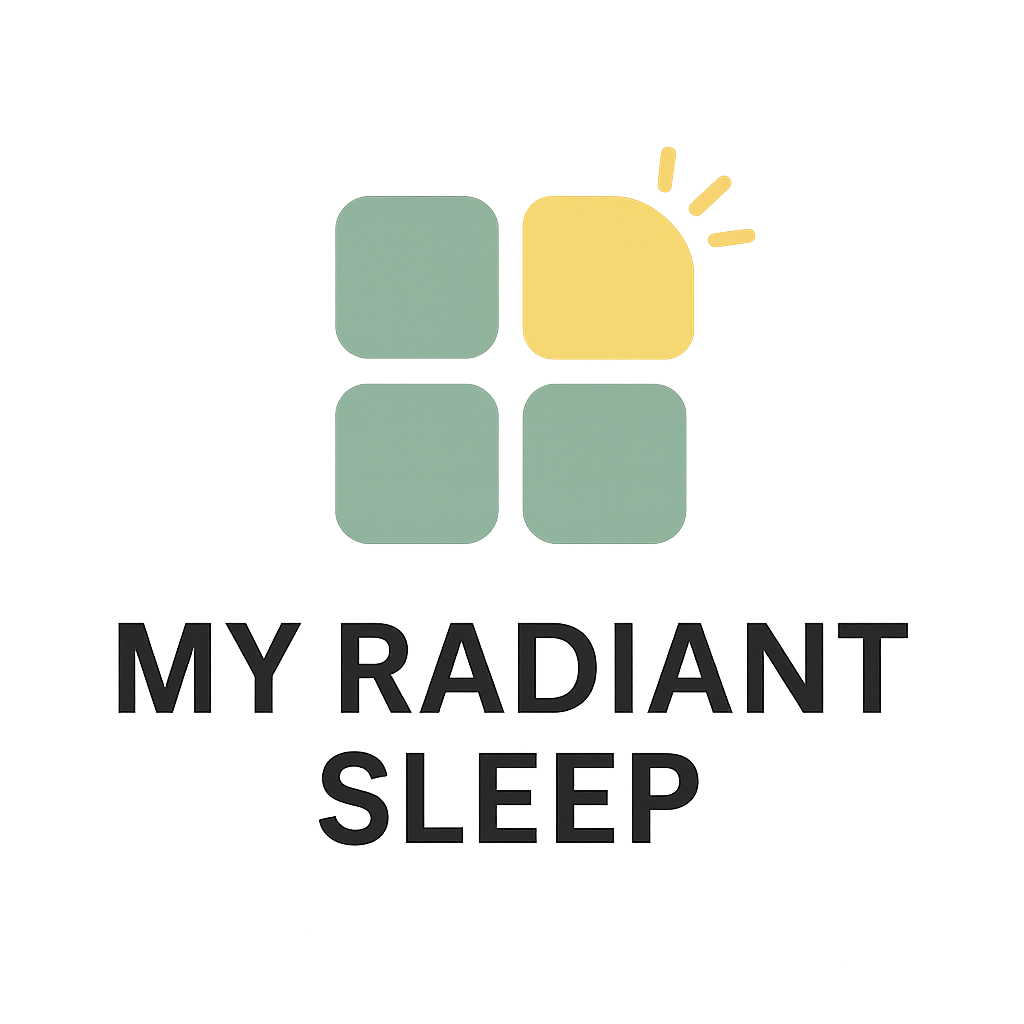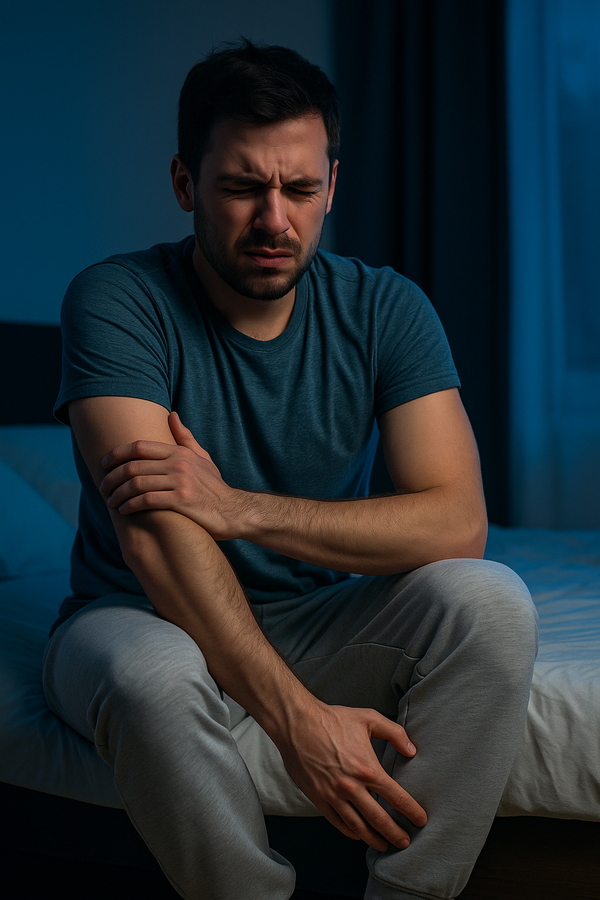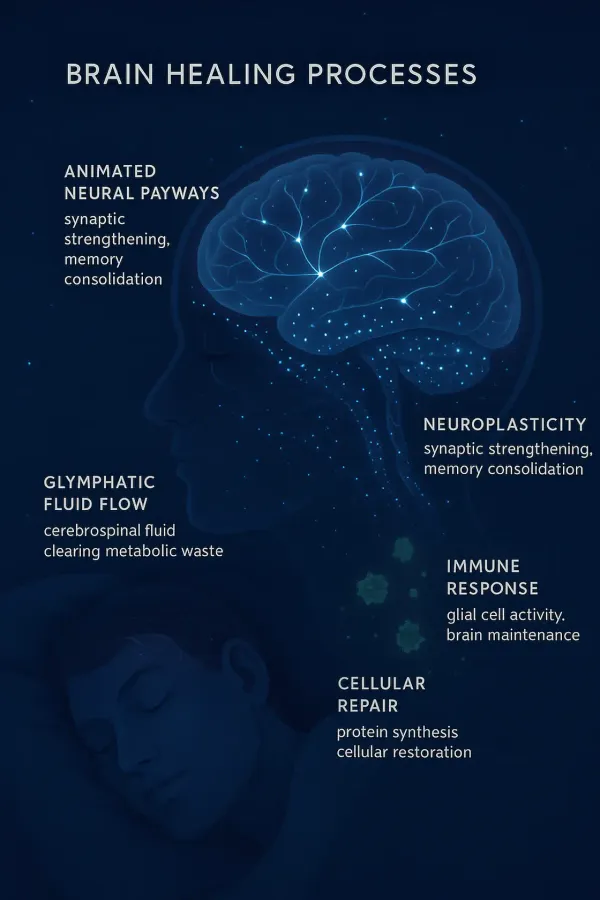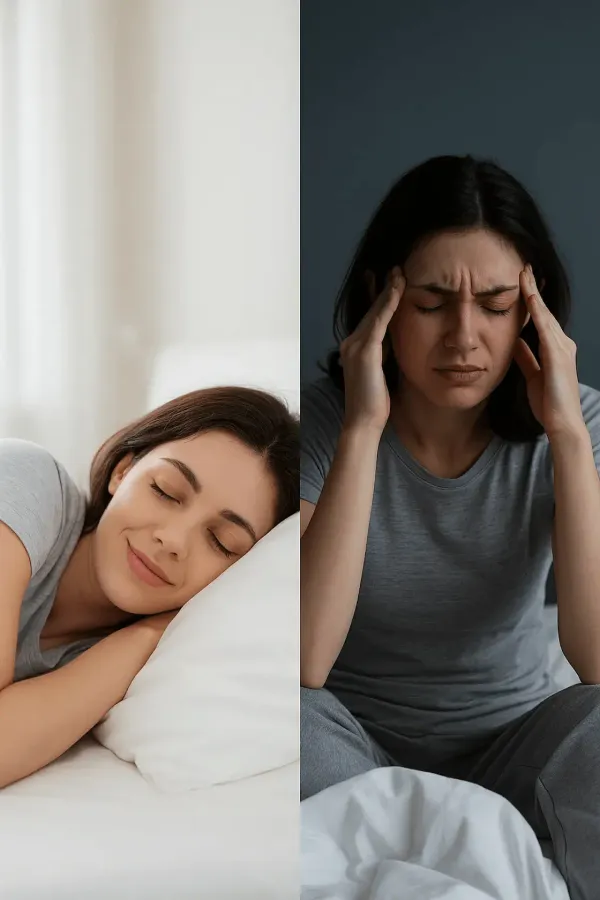(Last Update: 07/15/2025)
If you’ve ever jolted awake at 4:00 a.m., staring at the ceiling while your mind races and sleep feels impossible, you’re not alone.
Early waking insomnia — waking up too early and struggling to fall back asleep — is one of the most common sleep problems people face and affects millions.
But why does it happen, and more importantly, what can you do about it? This guide dives deep into the science, causes, treatments, and prevention strategies for early waking insomnia.
Stick with us — and consider bookmarking this guide to revisit whenever you need practical advice.
Understanding Early Morning Awakenings: What They Mean for Your Sleep
What Is Early Waking Insomnia?
Early waking insomnia—also called terminal insomnia or sleep‑maintenance insomnia—is when someone consistently wakes up too early (often around 4 a.m.) and can’t return to sleep. It differs from difficulty falling asleep (“sleep-onset insomnia”) and can be just as disruptive.
Late insomnia means waking much earlier than intended and struggling to fall back asleep. Unlike sleep onset or maintenance insomnia, it occurs at the end of the night.
Core Definition and Patterns of Chronic Insomnia
According to Cleveland Clinic, it’s one of the three main insomnia types alongside sleep-onset and middle insomnia.
Sleep onset insomnia refers to difficulty falling asleep at the beginning of the night, while sleep maintenance insomnia is characterized by difficulty staying asleep or waking up frequently during the night.
Primary insomnia describes insomnia symptoms that are not caused by another medical or psychiatric condition.
Understanding why we sleep and how it affects early waking insomnia can help identify where your sleep-wake cycle is being disrupted and how to restore balance.
Biological Mechanisms Behind Poor Sleep and Early Awakenings
Experts at Harvard Health explain that circadian rhythms are the underlying biological process regulating sleep timing, and circadian rhythm misalignment can shift sleep cycles too early.
Disruptions to the sleep cycle can cause early waking and difficulty maintaining sleep throughout the night.
Advanced Sleep Phase Syndrome (ASPS), also known as advanced sleep phase disorder, is common among early risers and early riser chronotypes.
Experts emphasize how core sleep plays a role in early morning awakenings, especially when REM stages are shortened or disrupted by stress or hormone cycles.
Symptoms to Watch For in Middle of the Night and Early morning awakening insomnia
If you're consistently waking up earlier than intended and struggling with rest, these signs may indicate premature awakening:
- Waking 30–60+ minutes earlier than planned
- Difficulty falling back asleep after waking
- Frequent awakenings during the night
- Trouble initiating sleep at bedtime
- Daytime fatigue, irritability, or mood swings
- Struggles with work performance or social interactions
Additional signs can include:
- Excessive daytime sleepiness
- Reduced alertness and concentration
Monitoring these symptoms can help determine whether you’re experiencing a temporary sleep disruption or a more persistent insomnia pattern needing intervention.
Some early waking may be related to undiagnosed apnea—these sleep apnea monitors help track nighttime breathing disruptions and improve sleep awareness.
Age and Risk Factors
Psychology Today notes older adults face higher risks due to natural circadian shifts. Sleep issues such as waking early are also common during middle age, as changes in sleep patterns and circadian rhythms begin to emerge.
In contrast, younger adults are more likely to experience sleep onset insomnia rather than early morning awakenings. As people age, they spend less time in the deeper stages of sleep, particularly deep sleep, which can contribute to increased awakenings and reduced sleep quality.
Insomnia Symptoms That Disrupt Sleep Early in the Morning

Premature awakening can result from a wide range of biological, psychological, and medical factors. Understanding the root causes is key to creating targeted treatment plans. Below are the main categories and their specific contributions to premature morning awakenings.
Biological and Neurological Causes of Poor Sleep in Older Adults
Circadian rhythm misalignment plays a central role in early morning awakenings. Your internal clock may be out of sync with your environment or daily habits.
- Jet lag, shift work, or seasonal light changes
- Advanced Sleep Phase Syndrome (ASPS): A condition where sleep and wake times are naturally earlier than desired
- Irregular sleep schedules: Reinforce wakefulness at the same early hour
- Alarm clock dependence: Can mask biological rhythm dysfunction
- Even modest disruptions to your daily routine—such as inconsistent light exposure or late-night activities—can throw off your biological rhythm.
- According to The Sleep Foundation, environmental and behavioral changes—including stress, inconsistent sleep timing, and fluctuating light exposure—can reinforce unhealthy sleep patterns and exacerbate early morning awakenings.
Common Causes: From Mental Health to Medical Issues
- Mood disorders: Depression and anxiety frequently cause early awakenings, especially in the early morning hours..
- Age-related changes: Older adults often experience fragmented sleep and reduced deep sleep, which makes them more prone to waking up early.
Physical conditions, such as pain, hot flashes, sleep apnea, and other medical issues, frequently underlie early waking.
Neurochemical and Hormonal Factors That Impact How You Fall Asleep
Your body’s sleep-wake cycle is tightly regulated by hormones like melatonin and cortisol, both of which fluctuate throughout the day and night.
- Melatonin drop-off in the evening
- Cortisol surges in the early morning
- Chronic stress: Elevates cortisol and interferes with the ability to fall or stay asleep. Acute stress or emotional upheaval can disturb hormonal cycles.
Psychological Causes
Mental health plays a significant role in insomnia. Conditions like depression and anxiety frequently interfere with sleep continuity and quality.
- Depression
- Shortened REM cycles
- Mood disruptions upon waking
- Anxiety
- Hyperarousal and light, restless sleep
- Persistent nighttime rumination
Both conditions can cause or worsen sleep disorders. In some cases, treating the mental health condition significantly improves sleep.
Medical Causes
Chronic medical conditions often lead to nighttime discomfort or disturbances, resulting in early waking.
- Chronic health issues
- Arthritis, migraines, and chronic pain
- GERD and cardiovascular conditions
- Sleep disorders
- Sleep apnea
Restless legs syndromeAccording toVerywell Health, even mild or undiagnosed sleep conditions—such as obstructive sleep apnea—can fragment your sleep cycle and trigger early morning awakenings.
These disruptions often go unnoticed yet significantly impact rest quality. In persistent cases, seeking a professional evaluation is recommended to uncover hidden disorders and guide treatment.
Lifestyle and Environmental Triggers That Keep Night Owls Awake or Wake Them Too Early

Your evening habits and sleep environment play a major role in sleep quality. Poor nighttime routines or disruptions in your surroundings can condition your body to wake up earlier than intended.
Evening Habits That Trigger Early Waking
- Eating heavy meals or drinking alcohol too close to bedtime
- Consuming caffeine late in the day
- Using screens before bed, which delays melatonin release
Environmental Factors That Disrupt Sleep
- Bedroom noise, artificial light, or uncomfortable temperatures
- Sharing the bed with snoring partners or restless pets
- Even seemingly minor issues—like a flickering light or warm room—can fragment sleep cycles over time.
- According to WebMD, subtle lifestyle and environmental influences may create persistent early waking patterns if left unaddressed. Improving your sleep setting and evening routine can significantly reduce these triggers.
Daily habits can exacerbate early waking:
- Excessive evening screen use (including TV and phones) suppresses melatonin.
- Alcohol and caffeine late in the day fragment sleep.
- Irregular work schedules or napping can disrupt the homeostatic sleep drive and circadian rhythms.
- Long stretches of quiet inactivity in the evening can send misleading signals to the brain, telling it it's “sleep time too early.”
Creating the right sleep environment for chronic insomnia sufferers is essential, especially when screen use and poor bedding disrupt your body’s natural rhythms.
My Bottom Line
Multiple causes often interact, making it essential to take a comprehensive approach. Sleep difficulties and poor sleep often occur together, and people with premature awakeningfrequently experience other insomnia symptoms as well.
Experts agree: addressing both internal and external triggers gives the best chance of lasting improvement.
Effective Treatments Like Cognitive Behavioral Therapy for Early Morning Awakenings

Managing premature awakening requires a multi-layered approach tailored to the root causes. From proven behavioral therapies to targeted environmental changes, effective treatment often blends psychological support with physical habit shifts.
While medications may play a short-term role, sustainable relief usually comes from addressing the mind, body, and environment together.
Behavioral and Psychological Interventions
Cognitive Behavioral Therapy for Insomnia (CBT-I) is considered the gold standard treatment for chronic insomnia. This structured, evidence-based therapy helps retrain your brain’s sleep patterns and reduce nighttime anxiety.
- Reframes negative thoughts about sleep
- Uses sleep restriction to consolidate rest
- Implements stimulus control to build a healthier sleep-wake association
Boosting Sleep Efficiency with Simple Changes
Small tweaks—rooted in sleep hygiene and health psychology—can improve sleep efficiency:
- Keep a consistent wake-and-sleep schedule, even on weekends
- Set up the right environment: cool, dark, quiet bedrooms with minimal electronics.
- Avoid heavy meals, alcohol, and stimulants before bedtime.
Try taking a warm shower before bed to help you ease into sleep.
Decades of research validate CBT-I as the most effective long-term treatment. The GoodSleep Clinic strongly recommends beginning with behavioral therapies before considering medications.
Relaxation and Mindfulness Techniques
Incorporating mindfulness-based strategies can reduce nighttime rumination and physical arousal.
- Guided meditation or calming breathing exercises
- Progressive muscle relaxation to release tension
- Body scan techniques to promote awareness and restfulness
Beyond CBT-I, mattresses for sleep disorders are tailored to relieve pressure points and encourage deeper rest for those waking too early.
Lifestyle and Environmental Adjustments

Lifestyle plays a powerful role in reinforcing either healthy or disruptive sleep patterns. According to Harvard Health, many cases of early waking are worsened by small, preventable habits.
Sleep Hygiene Improvements
- Maintain a consistent sleep schedule, even on weekends
- Avoid screens 1–2 hours before bed to prevent melatonin suppression
- Skip heavy meals and alcohol late at night
- Keep your bedroom cool, quiet, and dark
Practicing good sleep hygiene helps create strong biological cues for sleep and may significantly reduce early waking tendencies.
Light Therapy
Disruptions in circadian rhythm are a key cause of early morning awakenings. Light therapy can realign your internal clock.
Morning exposure to bright natural light helps anchor your wake time. Avoiding blue light in the evening helps signal melatonin release. Especially effective for Advanced Sleep Phase Syndrome (ASPS) or seasonal disruptions
Harvard Health emphasizes the power of morning light as a behavioral “reset.”
Environmental factors such as noise, room temperature, or screen exposure can cause ongoing sleep disturbances.
Optimizing your environment—like using blackout curtains and limiting evening screen time—can promote sleep by creating cues for your brain to wind down. Small changes in sleep hygiene often reduce nighttime awakenings and support more restful, uninterrupted sleep.
Medical Treatments
For persistent cases, medical options may be necessary. However, these are usually recommended after behavioral therapies have been tried.
Prescription Medications
- Short-term use of sedative-hypnotics may help during acute phases
- Should always be supervised by a healthcare provider
- Risk of dependence and rebound insomnia if misused
Melatonin Supplements
- Helpful for adjusting circadian timing
- Most effective when used temporarily and at the correct dosage
- Not a standalone treatment
The Cleveland Clinic cautions that medications without behavioral changes usually offer only short-lived benefits. Addressing underlying causes through therapy and routine adjustments remains essential for long-term success.
Cognitive behavioral treatment not only addresses trouble falling asleep but also helps people with secondary insomnia, where another condition such as a mental health disorder or chronic pain causes disrupted sleep.
One major goal is achieving consolidated sleep—unbroken, high-quality rest. CBT-I also helps retrain your body and mind to avoid the vicious cycle of worrying about how much sleep you're losing.
Many people turn to sleep medicine as a short-term aid for early waking. While sleep medications can help, prescription drugs should be used with caution and only when behavioral changes have proven ineffective.
Treatment Options from the National Institutes
- Cognitive Behavioral Therapy for Insomnia (CBT‑I) is the gold standard, especially effective for preventing long-term insomnia, reducing anxiety, and increasing sleep efficiency.
- When linked to circadian issues, light therapy or chronotherapy helps gently shift sleep timing.
A primary care provider or referral to a mental health specialist or sleep specialist may guide you through tailored treatments, including medication when needed.
My Verdict:
Effective treatment blends behavioral, environmental, and — when needed — medical strategies. Long-lasting results come not from shortcuts but from resetting the sleep system.
The goal of these strategies is to help you achieve a good night's sleep, improve your ability to sleep tonight, and restore the deeper stages of sleep essential for overall health.
If this guide is helping you, bookmark it now for future reference or share it with a loved one navigating premature awakening.
Prevention Strategies
Preventing early morning awakening insomniabegins with consistency and proactive lifestyle choices. When your body learns to expect rest at a specific time and environment, sleep becomes more stable and restorative. Combining physical habits with emotional regulation builds long-term protection against disrupted sleep patterns.
Establishing Strong Sleep Habits
Creating predictable signals that prepare your body for sleep helps reduce fragmented rest and prevent premature waking. A reliable nighttime routine cues your brain that it's time to wind down.
Wind-Down Routines
- Dim the lights about an hour before bedtime to signal melatonin production
- Avoid stimulating activities like screen use or intense work
- Steer clear of arguments or stressful conversations late in the evening
- Establish a nightly ritual such as reading, gentle stretching, or warm tea
Developing a consistent wind-down sequence supports a smoother transition into deep sleep. This is especially effective for people with stress-related insomnia.
Sleep Environment Optimization
- Keep your room cool, dark, and quiet to minimize sensory disruptions
- Use blackout curtains to block morning light
- Try a white noise machine to mask external sounds
- Limit bedroom clutter and distractions to enhance relaxation
According to the Sleep Foundation, a peaceful and consistent sleep environment is vital for long-term sleep quality. The goal is to train your brain to associate the bedroom with restful, uninterrupted sleep.
Developing a calming wind-down routine helps you fall asleep quickly and stay asleep longer. Practices like dimming lights, avoiding electronics, and stretching before bed cue the body to relax.
Over time, these habits reinforce your internal clock and prevent the fragmented rest often associated with terminal insomnia.
Incorporating these expert-backed sleep tips into your bedtime routine can help improve sleep duration and reduce the frequency of early morning insomnia.
Managing Stress and Mental Health
Emotional stress, anxiety, and mental overload are common contributors to early waking. Addressing the psychological side of sleep hygiene is just as crucial as physical habits.
Physical Activity
- Engage in moderate aerobic exercise like walking, biking, or yoga earlier in the day
- Evening stretching or gentle yoga can release tension without overstimulation
- Avoid high-intensity workouts too close to bedtime
Exercise helps regulate cortisol levels and promotes healthy fatigue. Regular movement also improves daytime alertness and overall mood stability.
Research—such as a meta-analysis involving yoga, Tai Chi, walking, and jogging—shows that physical activity not only promotes sleep onset but also reduces nighttime wakings and registers improvements in sleep maintenance and efficiency.
Mind Management
- Write down worries in a journal to prevent overthinking in the middle of the night
- Practice gratitude journaling to shift focus toward positivity
- Engage in mindfulness or guided meditation to lower bedtime anxiety
Cognitive calming rituals, such as journaling and mindfulness, reduce nighttime rumination—a key driver of terminal insomnia.
Stressful life events like grief, job loss, or caregiving often contribute to early morning awakening insomnia. Mental disorders such as depression or anxiety frequently affect sleep, particularly early in the morning.
For women, hormone fluctuations tied to women's health can amplify these effects. Over time, poor sleep can harm physical health, increasing blood pressure and cardiovascular risk. Getting regular exercise helps you feel tired at night, enhancing sleep depth.
Chronic insomnia can contribute to high blood pressure, especially when combined with stress or disrupted circadian rhythms.
Repeated early awakenings keep the nervous system activated, which elevates blood pressure and increases cardiovascular risk.
Learn how your mattress impacts poor sleep and early waking by examining comfort zones, spine support, and thermal regulation during the night.
My Bottom Line
Preventing terminal insomniaisn’t about perfection but about protecting core habits. Small, consistent actions can safeguard your sleep and well-being. The goal of prevention is to protect your ability to achieve a good night's sleep.
Found this section useful? Bookmark it or share with someone who could benefit from practical, science-backed sleep tips.
When Staying Up Late Becomes a Habit
People with a natural preference to stay up late—often called night owls—may struggle to go to bed early, leading to regularly waking too soon due to social or work obligations.
This mismatch between internal rhythms and external schedules contributes to fragmented sleep and next-day fatigue.
Diagnostic Tools and Understanding Sleep Needs
To properly diagnose early morning awakening insomnia professionals use criteria from the Diagnostic and Statistical Manual (DSM-5), ruling out other sleep disorders such as sleep apnea or restless legs syndrome.
Understanding how much sleep your body needs is also key—most adults require 7–9 hours. If you're getting far less and experience trouble sleeping consistently, it's time to explore treatment options.
When to Seek Professional Help

Signs You Need Expert Support
According to Psychology Today, you should seek help if: • Symptoms persist despite lifestyle changes
• Fatigue disrupts work, relationships, or safety
• You experience severe anxiety, depression, or physical pain
• You suspect a hidden medical or sleep disorder
• You experience persistent daytime sleepiness
What Professionals Offer
• Diagnostic assessments (including sleep studies)
• Review of your sleep diary to assess patterns and guide treatment
• Personalized CBT-I programs
• Medication evaluation if appropriate
Early waking that persists for three months or more is considered chronic insomnia. If daytime functioning suffers—or if there's a family history or coexisting medical condition—it’s essential to consult your primary care provider, sleep clinic, or mental health professional.
Early waking insomnia has multiple causes, including chronotype, lifestyle, health, and stress.
But simple, evidence-based habits like regulating schedules, reducing screen time, limiting stimulants, staying active, and seeking CBT‑I can help.
For natural early birds, aligning sleep with social and work demands—rather than fighting against each other—can make all the difference.
Conclusion
Early waking insomnia can be draining, but knowledge is power. By understanding your triggers and applying a balanced mix of behavioral, environmental, and — when needed — medical strategies, you can reclaim restful nights.
Improving sleep quality, understanding your sleep patterns, and addressing poor sleep are key steps to overcoming early morning awakening insomniaa.
If you’ve found this guide helpful, bookmark it now and share it widely. Let’s help others break free from the cycle of early morning awakening insomnia.
FAQs
How do I fix insomnia waking up early?
Fixing early morning insomnia involves improving your sleep hygiene: maintain a consistent sleep schedule, avoid screens before bed, limit alcohol and caffeine, and create a calming bedtime routine. Light therapy and cognitive behavioral therapy for insomnia (CBT-I) can also help regulate your body clock.
Why do I wake up at 4am and can't get back to sleep?
Waking up at 4am may result from stress, hormonal shifts, or disrupted circadian rhythms. Low melatonin levels or high cortisol can make returning to sleep difficult. Try relaxation techniques, avoid checking the time, and consult a sleep specialist if it becomes a frequent issue.
How to treat early morning insomnia?
Treat early morning insomnia with consistent sleep routines, reducing light and noise exposure, and avoiding stimulating activities before bed. CBT-I is an effective long-term treatment. Address underlying issues like anxiety, depression, or sleep apnea, which may contribute to premature awakenings and sleep fragmentation.
Why do I wake up at 3.30 every morning?
Waking up at 3:30 a.m. may stem from stress, blood sugar dips, or an overactive mind. It’s also a common sign of disrupted REM sleep. Consider a calming nighttime routine, a light bedtime snack, and speaking to a healthcare provider to rule out medical conditions.







